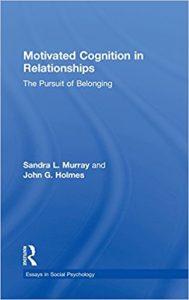Dr. Murray has authored two books that discusses the major themes of her research.

Motivated Cognition in Relationships: The Pursuit of Belonging
This book is essential for social and personality psychologists and will also be valuable to clinical psychologists and clinicians who work directly with couples to effect more happy and stable relationships.

Interdependent Minds: The Dynamics of Close Relationships
In this book, two pioneering researchers present a groundbreaking theory of how mutually responsive behaviors emerge—or fail to emerge—in relationships.
Publications
Wood, J. V., Forest, A. L., Frisen, J., Murray, S. L., Holmes, J. G., & McNulty, J. K. (2024). Self-esteem and romantic relationship quality. Nature Reviews, 3, 27-41. https://doi.org/10.1038/s44159-023-00247-z
Murray, S. L., & Pascuzzi, G. (2024). Pursuing safety in social connection: A flexibly fluid perspective on risk-regulation in relationships. Annual Review of Psychology, 75. https://doi.org/10.1146/annurev-psych-011123-024815
Murray, S. L. (2023). Regulating relationship risk: Partner responsiveness as a safety signal. Current Opinion in Psychology. https://doi.org/10.1016/j.copsyc.2023.101582.
Murray, S. L., McNulty, J., Xia, J., Lamarche, V., Seery, M. D., Ward, D., Griffin, D. W., Hicks, L, Jung, H. Y. (2023). Pursuing safety in social connection regulates the risk-regulation, social-safety, and behavioral-immune systems. Journal of Personality and Social Psychology, 125(3), 519–547. https://doi.org/10.1037/pspi0000420
Murray, S.L., Xia, J., Lamarche, V. L., Seery, M. D., McNulty, J., Griffin, D. W., Ward, D., Jung, H. Y., Hicks, L., & Dubois, D. (2023). A moth to a flame? Implicit social connection inoculates conspiracy theorists against COVID-19 misinformation. Current Research in Ecological and Social Psychology. https://doi.org/10.1016/j.cresp.2023.100111
Murray, S. L., Xia, J., Lamarche, V. M., Seery, M. D., McNulty, J., Ward, D. E., Griffin, D. W., & Hicks, L. (2023). Sensitizing the behavioral-immune system: The power of social pain. Social Psychological and Personality Science, 14(4), 371–380. https://doi.org/10.1177/19485506221107741
Murray, S.L., Xia, J., Lamarche, V., Seery, M.D., McNulty, J. K., Griffin, D. W., Ward, D. E., & Hicks, L. L. (2022). Trust as a daily defense against collective disease threats. Current Research in Ecological and Social Psychology, 3,100071, https://doi.org/10.1016/j.cresp.2022.100071.
Lamarche, V., Seery, M. D., Murray, S. L., Kondrak, C. L., Saltsman, T. L., & Streamer, L. (2022). Ecologically motivated relationship safety regulation. Current Research in Ecological and Social Psychology, 3, 100061, https://doi.org/10.1016/j.cresp.2022.100061.
Murray, S. L., Seery, M. D., Lamarche, V., Jung, H. Y., Saltsman, T. L., Griffin, D. W., Dubois, D., Xia, J., Ward, D. E., & McNulty, J. (2021). Looking for safety in all the right places: When threatening political reality strengthens family relationship bonds. Social Psychological and Personality Science, 12, 1193-1202. https://doi.org/10.1177/19485506211018351
Murray, S. L., Lamarche, V., Seery, M.D., Jung, H. Y., Griffin, D. W., & Brinkman, C. (2021). The social-safety system: Fortifying relationships in the face of the unforeseeable. Journal of Personality and Social Psychology, 120, 99-130. https://doi.org/10.1037/pspi0000245
Murray, S. L., Seery, M.D., Lamarche, V., Kondrak, C., & Gomillion, S. (2019). Implicitly imprinting the past on the present: Automatic partner attitudes and the transition to parenthood. Journal of Personality and Social Psychology, 116, 69-100. https://doi.org/10.1037/pspi0000143
Murray, S. L., Lamarche, V. M., & Seery, M. D. (2018). Romantic relationships as shared reality defense. Current Opinion in Psychology, 23, 34-37. https://doi.org/10.1016/j.copsyc.2017.11.008
Murray, S. L., Lamarche, V., Gomillion, S., Seery, M. D., & Kondrak, C. (2017). In defense of commitment: The curative power of violated expectations in relationships. Journal of Personality and Social Psychology, 113, 697-729. https://doi.org/10.1037/pspi0000102
Murray, S. L., & Holmes, J. G. (2015). Maintaining mutual commitment in the face of risk. Current Opinion in Psychology, 1, 57-60. https://doi.org/10.1016/j.copsyc.2014.11.005
Murray, S. L., Holmes, J., G., Griffin, D. W., & Derrick, J. L. (2015). The equilibrium model of relationship maintenance. Journal of Personality and Social Psychology, 108, 93-113. https://doi.org/10.1037/pspi0000004
Murray, S. L., Gomillion, S., Holmes, J. G., & Harris, B. L. (2015). Inhibiting self-protection in romantic relationships: Automatic partner attitudes as a resource for low self-esteem people. Social Psychological and Personality Science, 6, 173-182. https://doi.org/10.1177/1948550614549386
Gomillion, S., Murray, S. L., & Lamarche, V. (2015). Losing the wind beneath your wings: The prospective influence of romantic break-up on goal progress. Social Psychological and Personality Science, 6, 513-520. https://doi.org/10.1177/1948550614568160
Lamarche, V. M., & Murray, S. L. (2014). Selectively myopic? Self-esteem and attentional bias in response to potential relationship threats. Social Psychological and Personality Science, 5, 786-795. https://doi.org/10.1177/1948550614532377
Gomillion, S., Lamarche, V. M., & Murray, S. L. (2014). Protected by your self-control: The influence of partners’ self-control on actors’ responses to interpersonal risk. Social Psychological and Personality Science, 5, 873-882. https://doi.org/10.1177/1948550614538462
Gomillion, S., Gabriel, S., & Murray, S. L. (2014). A friend of yours is no friend of mine: Jealousy towards a romantic partner’s friends. Social Psychological and Personality Science, 5, 636-643. https://doi.org/10.1177/1948550614524447
Gomillion, S., & Murray, S. L. (2014). Shifting dependence: The influence of partner instrumentality and self-esteem on responses to interpersonal risk. Personality and Social Psychology Bulletin, 40, 57-69. https://doi.org/10.1177/0146167213503885
Murray, S. L., Holmes, J. G., Derrick, J. L., Harris, B., Griffin, D. W., & Pinkus, R. T. (2013). Cautious to a fault: Self-protection and the trajectory of marital satisfaction. Journal of Experimental Social Psychology, 49, 522-533. doi: 10.1016/j.jesp.2012.10.010
Murray, S. L., Gomillion, S., Holmes, J. G., Harris, B., & Lamarche, V. (2013). The dynamics of relationship promotion: Controlling the automatic inclination to trust. Journal of Personality and Social Psychology, 104, 305-334.
Murray, S. L., Lupien, S. P., & Seery, M. D. (2012). Resilience in the face of romantic rejection: The automatic impulse to trust. Journal of Experimental Social Psychology, 48, 845-854. https://doi.org/10.1037/a0030513
Cavallo, J., Holmes, J. G., Fitzsimons, G., Murray, S. L., & Wood, J. (2012). Managing motivational conflict: How self-esteem and executive resources influence self-regulatory responses to risk. Journal of Personality and Social Psychology, 103, 430-451. https://doi.org/10.1037/a0028821
Murray, S. L., Pinkus, R. T., Holmes, J. G., Harris, B., Gomillion, S., Aloni, M., Derrick, J., & Leder, S. (2011). Signaling when (and when not) to be cautious and self-protective: Impulsive and reflective trust in close relationships. Journal of Personality and Social Psychology, 101, 485-502. https://doi.org/10.1037/a0023233
Murray, S.L., Griffin, D. W., Derrick, J., Harris, B., Aloni, M., & Leder, S. (2011). Tempting fate or inviting happiness: Unrealistic idealization prevents the decline of marital satisfaction in newlyweds. Psychological Science, 22, 619-626. doi: 10.1177/0956797611403155
Murray, S. L., Holmes, J. G., & Pinkus, R. T. (2010). A smart unconscious? Procedural origins of automatic partner attitudes in marriage. Journal of Experimental Social Psychology, 46, 650-656. https://doi.org/10.1016/j.jesp.2010.03.003
Murray, S. L., Leder, S., McGregor, J. C. D., Holmes, J. G., Pinkus, R. T., & Harris, B. (2009). Becoming irreplaceable: How comparisons to the partner’s alternatives differentially affect low and high self-esteem people. Journal of Experimental Social Psychology, 45, 1180-1191. https://doi.org/10.1016/j.jesp.2009.07.001
Murray, S. L., & Holmes, J. G. (2009). The architecture of interdependent minds: A motivation-management theory of mutual responsiveness. Psychological Review, 116, 908-928. https://doi.org/10.1037/a0017015
Murray, S. L., Holmes, J. G., Aloni, M., Pinkus, R., Derrick, J. L., & Leder, S. (2009). Commitment insurance: Compensating for the autonomy costs of interdependence in close relationships. Journal of Personality and Social Psychology, 97, 256-278. https://doi.org/10.1037/a0014562
Murray, S. L., Aloni, M., Holmes, J. G., Derrick, J. L., Stinson, D. A., & Leder, S. (2009). Fostering partner dependence as trust insurance: The implicit contingencies of the exchange script in close relationships. Journal of Personality and Social Psychology, 96, 324-348. https://doi.org/10.1037/a0012856
Harris, P., Griffin, D., & Murray, S. L. (2008). Testing the limits of optimistic bias: Event and person moderators in a multi-level framework. Journal of Personality and Social Psychology, 95, 1225-1237. DOI: 10.1037/a0013315
Murray, S. L., Derrick, J., Leder, S., & Holmes, J. G. (2008). Balancing connectedness and self-protection goals in close relationships: A levels of processing perspective on risk regulation. Journal of Personality and Social Psychology, 94, 429-459. https://doi.org/10.1037/0022-3514.94.3.429
Derrick, J. L., & Murray, S. L. (2007). Enhancing relationship perceptions by reducing felt inferiority: The moderating role of attachment style. Personal Relationships, 14, 531-549. https://doi.org/10.1111/j.1475-6811.2007.00170.x
Murray, S. L., Holmes, J. G., & Collins, N. L. (2006). Optimizing assurance: The risk regulation system in relationships. Psychological Bulletin, 132, 641-666. https://doi.org/10.1037/0033-2909.132.5.641
Murray, S. L., Griffin, D. W., Rose, P., & Bellavia, G. (2006). For better or worse? Self-esteem and the contingencies of acceptance in marriage. Personality and Social Psychology Bulletin, 32, 866-882. DOI: 10.1177/0146167206286756
Murray, S. L. (2005). Regulating the risks of closeness: A relationship-specific sense of felt security. Current Directions in Psychological Science, 14, 74-78. https://doi.org/10.1111/j.0963-7214.2005.00338.x
Murray, S. L., Rose, P., Holmes, J. G., Derrick, J., Podchaski, E., Bellavia, G., & Griffin, D. (2005). Putting the partner within reach: A dyadic perspective on felt security in close relationships. Journal of Personality and Social Psychology, 88, 327-347. https://doi.org/10.1037/0022-3514.88.2.327
DeHart., T., Pelham, B. W., & Murray, S. L. (2004). Implicit dependency regulation: Self-esteem, relationship closeness, and implicit evaluations of close others. Social Cognition, 22, 126-146. https://doi.org/10.1521/soco.22.1.126.30986
Murray, S. L., Bellavia, G., Rose, P., & Griffin, D. (2003). Once hurt, twice hurtful: How perceived regard regulates daily marital interaction. Journal of Personality and Social Psychology, 84, 126-147. doi.org/10.1037/0022-3514.84.1.126
DeHart, T., Murray, S. L., Pelham, B., & Rose, P. (2003). The regulation of dependency in non-romantic relationships. Journal of Experimental Social Psychology, 39, 59-67. https://doi.org/10.1016/S0022-1031(02)00511-5
Bellavia, G., & Murray, S. L. (2003). Did I do that? Self-esteem related differences in reactions to romantic partners’ moods. Personal Relationships, 10, 77-96. https://doi.org/10.1111/1475-6811.00037
Murray, S. L., Rose, P., Bellavia, G., Holmes, J. G., & Kusche, A. (2002). When rejection stings: How self-esteem constrains relationship-enhancement processes. Journal of Personality and Social Psychology, 83, 556-573. DOI: 10.1037//0022-3514.83.3.556
Murray, S. L., Holmes, J. G., Bellavia, G., Griffin, D. W., & Dolderman, D. (2002). Kindred spirits? The benefits of egocentrism in close relationships. Journal of Personality and Social Psychology, 82, 563-581. https://doi.org/10.1037/0022-3514.82.4.563
Murray, S. L., Bellavia, G., Feeney, B., Holmes, J. G., & Rose, P. (2001). The contingencies of interpersonal acceptance: When romantic relationships function as a self-affirmational resource. Motivation and Emotion, 25, 163-189. https://doi.org/10.1023/A:1010618010115
Murray, S. L., Holmes, J. G., Griffin, D. W., Bellavia, G., & Rose, P. (2001). The mismeasure of love: How self-doubt contaminates relationship beliefs. Personality and Social Psychology Bulletin, 27, 423-436. https://doi.org/10.1177/0146167201274004
Murray, S. L., Holmes, J. G., Dolderman, D., & Griffin, D. W. (2000). What the motivated mind sees: Comparing friends’ perspectives to married partners’ views of each other. Journal of Experimental Social Psychology, 36, 600-620. https://doi.org/10.1006/jesp.1999.1417
Murray, S. L., Holmes, J. G., & Griffin, D. W. (2000). Self-esteem and the quest for felt security: How perceived regard regulates attachment processes. Journal of Personality and Social Psychology, 78, 478-498. DOI: 10.1037//0022-3514.78.3.478
Murray, S. L., & Holmes, J. G. (1999). The (mental) ties that bind: Cognitive structures that predict relationship resilience. Journal of Personality and Social Psychology, 77, 1228-1244. https://doi.org/10.1037/0022-3514.77.6.1228
Murray, S. L. (1999). The quest for conviction: Motivated cognition in romantic relationships. Psychological Inquiry, 10, 23-34. https://doi.org/10.1207/s15327965pli1001_3
Griffin, D., Murray, S. L., & Gonzalez, R. (1999). A friendly note on difference scores: A conceptual primer. Personal Relationships, 6, 505-518. 10.1111/j.1475-6811.1999.tb00206.x
Murray, S. L., Holmes, J. G., MacDonald, G., & Ellsworth, P. (1998). Through the looking glass darkly? When self-doubt turns into relationship insecurities, Journal of Personality and Social Psychology, 75, 1459-1480. https://doi.org/10.1037/0022-3514.75.6.1459
Murray, S. L., & Holmes, J. G. (1997). A leap of faith? Positive illusions in romantic relationships. Personality and Social Psychology Bulletin, 23, 586-604. https://doi.org/10.1177/0146167297236003
Murray, S. L., Holmes, J. G., & Griffin, D. W. (1996). The self-fulfilling nature of positive illusions in romantic relationships: Love is not blind, but prescient. Journal of Personality and Social Psychology, 71, 1155-1180. DOI: 10.1037//0022-3514.71.6.1155
Murray, S. L., Holmes, J. G., & Griffin, D. W. (1996). The benefits of positive illusions: Idealization and the construction of satisfaction in close relationships. Journal of Personality and Social Psychology, 70, 79-98. https://doi.org/10.1037/0022-3514.70.1.79
Murray, S. L., & Holmes, J. G. (1994). Story-telling in close relationships: The construction of confidence. Personality and Social Psychology Bulletin, 20, 663-676. https://doi.org/10.1177/0146167294206004
Murray, S. L., & Holmes, J. G. (1993). Seeing virtues in faults: Negativity and the transformation of interpersonal narratives in close relationships. Journal of Personality and Social Psychology, 65, 707-722. https://doi.org/10.1037/0022-3514.65.4.707